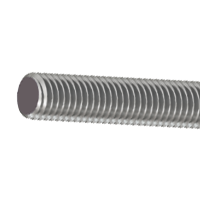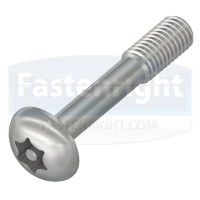
See Products
Titanium Fasteners
Titanium Bolts, Screws, Nuts & Washers
We supply a range of screws and fixings manufactured in titanium.
These fasteners are lightweight, with high tensile strength and corrosion resistance. Titanium’s high melting point makes it suitable for use in high-temperature applications, e.g. in the aerospace, medical and shipping sectors.
Titanium screws are available from stock, or on short lead times, in either:
Grade 2:
Unalloyed titanium, classed as “commercially pure” is widely used for industrial applications, due to its strength, corrosion resistance and formability.
Grade 5:
Also known as Ti 6Al-4V, grade 5 titanium is alloyed with 6% aluminum and 4% vanadium. A popular choice for fasteners and fixings, titanium grade 5 is 30% stronger than steel but nearly 50% lighter, with high strength and corrosion resistance.
See our stocked products below.
Other grades are available, and we can also manufacture all types of fixing from titanium – these are made to order, minimum quantities apply.
Make an enquiry about titanium fasteners
Showing all 17 results
-

Threaded Captive Washers for Captive Screws
SKU: CP41
-

Titanium Socket Cap Screws (DIN 912)
SKU: TI01
-

Titanium Hexagon Head Screw (DIN 933)
SKU: TI02
-

Titanium Socket Countersunk Screws (DIN 7991)
SKU: TI03
-
Titanium Socket Button Head Screws
SKU: TI04
-

Titanium Slot Cheese Pan Head Screw (DIN 84)
SKU: TI05
-
Titanium Slot Countersunk Screw
SKU: TI06
-
Titanium Flat Washers (DIN 125)
SKU: TI07
-
Titanium Full Nuts (DIN 934)
SKU: TI08
-
Titanium Nyloc Nuts (DIN 985)
SKU: TI09
-
Titanium Half Nut (DIN 439)
SKU: TI10
-
Titanium Dome Nut
SKU: TI11
-
Titanium Wing Nut (DIN 315)
SKU: TI12
-
Titanium Pozi Pan Head Screws (DIN 7985)
SKU: TI13
-
Titanium Pozi Countersunk Screws (DIN 965)
SKU: TI14
-
Titanium Hexagon Flange Nuts (DIN 6923)
SKU: TI15
-
Titanium Spring Washers
SKU: TI16
When to Use Titanium Bolts, Screws, Nuts & Washers
What is Titanium?
Titanium is a versatile metal with a broad range of characteristics that are well suited for use as fasteners and fixings. Titanium can be supplied in its natural form, referred to as “commercially pure” titanium, or as part of an alloy with other elements such as aluminium, molybdenum and iron. These are added to the composition to provide or enhance certain desirable properties.
This metal is typically selected for high-performance applications which demand a strong and lightweight material with excellent corrosion resistance. Titanium is typically a silvery-grey or metallic-white colour, providing a sleek and attractive appearance, whether the fasteners are hidden from view or exposed to the elements.
Advantages of Titanium Fasteners
One of the main benefits of titanium bolts, screws, nuts & washers is how strong they are in relation to their weight. Titanium is unique due to the fact it has a low-density but a high tensile strength. The metal shares similar strength levels to steel but is almost 50% lighter, and when compared to aluminium, although it has a higher density, titanium is over 50% stronger. This gives titanium an unrivalled strength-to-weight ratio – the highest of any metallic element.
In addition to this, titanium bolts, screws, nuts & washers host excellent resistance to corrosion caused by chloride and chlorine solutions, as well as both natural and sea water. This is due to the protective passivation layer formed in the presence of oxygen which thickens over time, increasing resistance to pitting, crevice corrosion, and stress corrosion cracking.
Titanium has a relatively high melting point of approximately 1650°C – much higher than comparable materials such as steel, stainless steel, and aluminium. These fasteners are also non-toxic and typically non-magnetic, making them ideal for use in situations where magnetic fields need to be considered.
Common Applications for Titanium Fasteners
The extensive range of benefits provided by titanium make it the go-to material for a wide variety of applications and environments.
The aerospace and aeronautical industries rely heavily on titanium bolts, screws, nuts & washers due to their strong yet lightweight nature. They are often found in components such as beams and frames to provide structural rigidity while keeping weight to a minimum. The automotive industry also takes advantage of titanium’s high strength-to-weight ratio, particularly in exotic cars where performance gains are achieved by making parts lighter while maintaining robustness.
Other industries opt for titanium due to its superb corrosion resistance. Naval applications see titanium used as part of internal equipment, as well as external components which come into frequent contact with saltwater. Titanium fasteners are often selected for projects in offshore environments and are widely used for marine applications due to a reduction in associated maintenance costs over their long lifespan.
Military applications require the use of highly durable materials that can operate effectively in some of the harshest conditions and climates. Titanium is seen as an ideal choice for this due to its excellent strength and chemical resistance, while the additional weight savings allow for greater mobility while in service. As titanium is also biocompatible and non-magnetic, these fasteners are highly utilised in the medical industry as part of instruments, implants, and prosthetics.
When to Avoid Titanium
Titanium is an extremely capable and versatile material, but it is not appropriate for every application. The first thing to consider is that although it has excellent corrosion resistance to many substances, it is less resistant to hydrochloric and sulfuric acids, as well as other reducing media. These chemicals, along with those containing no moisture such as dry chlorine or chloride gases, will attack the passivation layer and rapidly corrode the fastener.
Titanium also has relatively low levels of thermal and electrical conductivity, so is less suitable for electrical applications or those that require high transmission of heat. While these fasteners have a high melting point, titanium typically starts to lose strength when heated above 400°C, unlike other superalloys with a larger quantity of nickel. This reduces their effectiveness in high temperature applications with high strength requirements.
One of the main drawbacks of this metal is its cost. Titanium offers a desirable set of characteristics, but it is relatively expensive when compared to other materials. The use of titanium bolts, screws, nuts & washers will primarily depend on the demands of the application and the project budget. If there are no weight restrictions, stainless steel offers great strength and corrosion resistance. If the fastener must be as light as possible, aluminium may provide a cheaper alternative.
Choosing the Correct Grade
If you have decided titanium is the perfect material for the job, choosing the most appropriate grade can be difficult. There are two grades which are most utilised for titanium bolts, screws, nuts & washers:
Grade 2 consists of more than 99% titanium and is otherwise known as “commercially pure” titanium. It is one of the most common grades, hosting double the strength of A4 stainless steel.
Grade 5 is often referred to as the “workhorse” grade, composed of 90% titanium, 6% aluminium, and 4% vanadium. It hosts double the strength of grade 2, making it 4x stronger than A4 stainless steel.
The other two common, but more specialist grades are:
Grade 7 is equivalent to titanium grade 2, featuring a small percentage of palladium to further increase corrosion resistance. This grade is used in situations with a higher risk of chemical corrosion such as chemical processing equipment and other chemical related applications.
Grade 23 shares many similarities to titanium grade 5. It contains reduced proportions of oxygen, nitrogen, carbon, and iron. This results in higher ductility and fracture toughness. It is also biocompatible for use in the medical industry.
Titanium Bolts, Screws, Nuts & Washers Available Now
We stock and supply an extensive range of titanium components here at Fastenright. Titanium bolts, screws, nuts & washers are typically made from titanium grade 2 or titanium grade 5. Other grades of titanium can also be supplied. Fasteners with non-standard sizes, grades, and finishes are available to order as specials, as well as bespoke parts made to customer drawings.
Make an enquiry about titanium fasteners or call us to speak to an expert.















